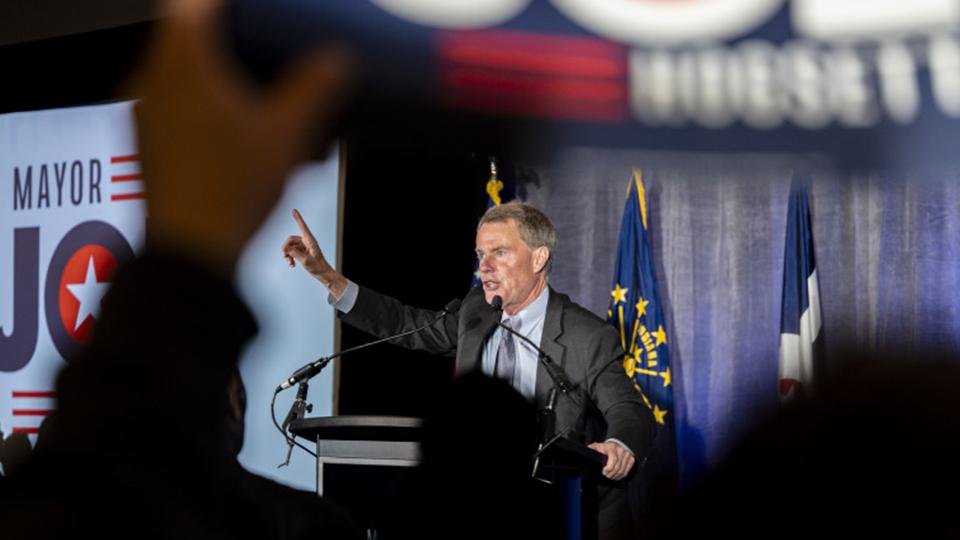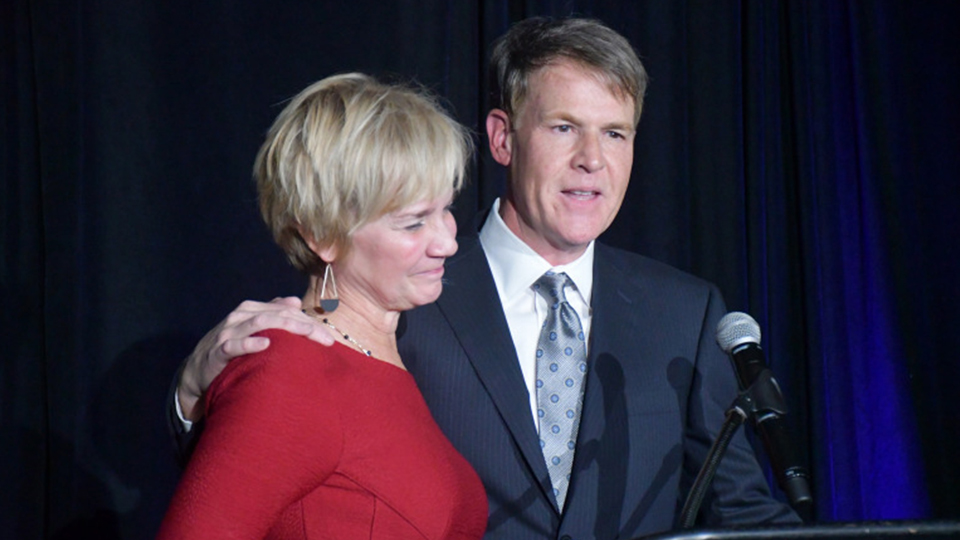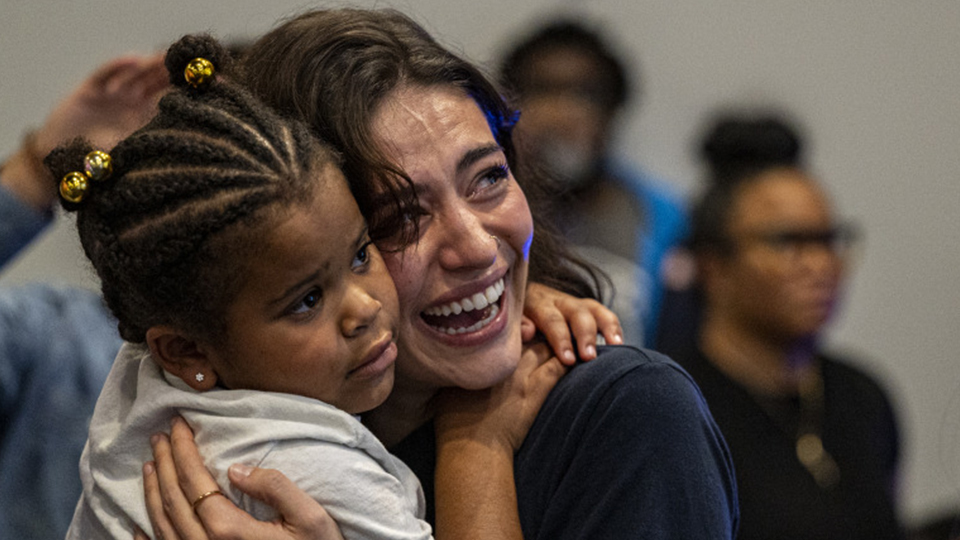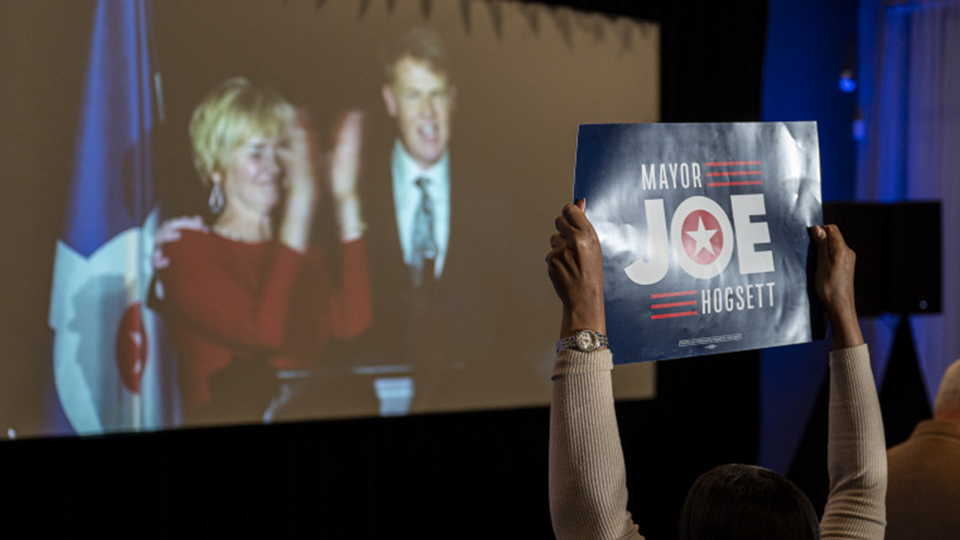Hogsett wins third term in most expensive mayor’s race in Indianapolis history
Subscriber Benefit
As a subscriber you can listen to articles at work, in the car, or while you work out. Subscribe Now
Democratic Mayor Joe Hogsett beat back his best-funded Republican challenger ever in businessman Jefferson Shreve, winning a third term Tuesday in what was the most expensive mayoral race in Indianapolis history.
Running on his administration’s fiscal accomplishments and a desire to finish business disrupted by the COVID-19 pandemic, Hogsett had won about 60% of the vote to Shreve’s 40% with nearly all of Marion County’s vote counted. At about 8:52 p.m., Shreve campaign officials said Shreve was calling Hogsett to concede the race.
Hogsett took the stage about an hour later, saying of that “we together highlighted the challenges and the opportunities present in our city.”
He referenced his re-election campaign announcement in City Market last November, repeating that the pandemic delayed but did not deny Indianapolis’ progress.
“Over the past many years, we have rejoiced together and we have stood in solace together,” Hogsett said. “In good times and in tough times, it has been the residents of our beautiful city who have kept us focused and energized, and that does not stop today.”
Hogsett said his administration’s next steps include getting guns off the streets and infusing new money into the city’s roads.
With his victory, Hogsett became the first mayor since the late Bill Hudnut to win three consecutive terms. Hudnut, who ended his fourth term in 1992, is the longest-serving Indianapolis mayor. If Hogsett serves a full third term, he would become the city’s second-longest serving mayor.
Spending in the mayor’s race was expected to top $20 million, once the final tally is complete. As of mid-October, Shreve had given $13.5 million of his own fortune to his campaign. Hogsett set a personal campaign finance record this year by raising $2.6 million as of mid-October, giving him a total campaign war chest of more than $6 million for this election cycle.
Speaking to supporters, Shreve said he made the decision to challenge Hogsett with his heart, not his head.

“This candidate has grown tremendously. … Now it’s been an expensive education,” he said as the crowd laughed. “But I have grown tremendously.”
For his money, Shreve did manage to perform better than Hogsett’s previous underfunded Republican opponents. In 2019, former state Sen. Jim Merritt netted just 27% of the vote, while 2015 Republican mayoral candidate Chuck Brewer garnered 37%.
But Shreve’s relentless hammering of Hogsett for the city’s homicide rate and his inability to fill more than 300 police officer openings weren’t enough to persuade voters to deny Hogsett a third term.
Shreve blamed the defeat in part on straight-ticket voting. Reports from the Marion County Election Board indicated about two-thirds of Indianapolis voters pulled a straight ticket, meaning they were able to vote for all the candidates in one party with a single push of a button. Those straight-ticket voters broke heavily for Democrats.
“The straight ticket partisanship that is Marion county is sobering and we just have to learn to work within that model to advance change and improve our city,” Shreve said.
Hogsett called Shreve a “long-valued” member of the Indianapolis community and says he welcomes continued contributions from his former opponent to bring Indianapolis closer to the city they envision.
Hogsett, a fiscally-conservative moderate Democrat, leaned heavily on his record of bipartisan-passed balanced budgets, record police funding and non-police violence-reduction strategies.
But some of his campaign ads focused more on national issues such as abortion rights and gun control and tried to paint Shreve as conservative extremist that Democrats should fear. It was that approach which drew national attention and Hogsett’s victory gave Democrats more hope that their abortion-rights message would resonate across the country in 2024 in the aftermath of the U.S. Supreme Court’s overturning of Roe v. Wade.

As for the future of downtown Indianapolis, Hogsett said he planned to focus on capitalizing on new economic development spurred by the splitting of IUPUI, increasing residential housing and continuing the city’s convention and tourism sports strategy through a planned expansion of the Indiana Convention Center.
While critics slammed Hogsett for a lack of vibrancy around the office buildings on and near Monument Circle as the pandemic eased, he was quick to point out an eye-popping pipeline of nearly $9 billion in development either underway or expected to begin downtown in the next few years.
“That is, to me, an indicator of success in Indianapolis and potential growth that … may very well supersede our pattern and experience with growth over the next four or five years,” Hogsett told IBJ during the campaign.
Those projects include a $500 million convention center expansion, a $300 million proposed redevelopment of the CSX building across Pennsylvania Street from Gainbridge Fieldhouse, a $4.3 billion Indiana University Health complex on the north side of downtown, and a $100 million headquarters campus for Elanco Animal Health.
Hogsett decided in May that the city would take over financing and ownership of the $510 million Signia Hotel planned to support the convention center expansion. The city made the move after the developer determined it wasn’t possible to secure practical interest rates to finance the project on the private market.

The decision drew criticism both from Shreve and local hoteliers as anti-free market.
Hogsett’s campaign also largely laid the groundwork for the city’s 2024 priorities at the state Legislature. Hogsett has proposed a change to the state’s road funding formula that would stop it from favoring rural counties and an exemption to a state law that prevents Indianapolis from enacting local gun control measures. Shreve favored the latter approach as well.
The campaign was probably Hogsett’s most difficult on a personal level. His wife, Stephanie, filed for divorce in September. He also faced scrutiny after he missed a week of events due to a fall that resulted in a busted lip.
